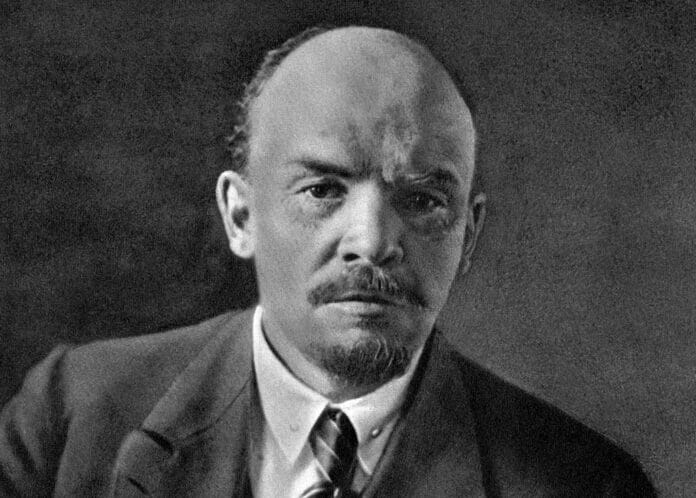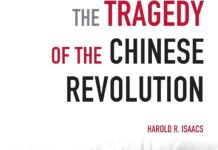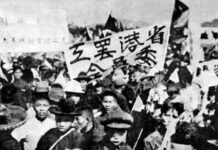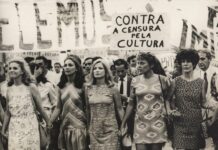Lenin’s ideas united workers across nations to fight capitalism and imperialism
Socialist Alternative (ISA in England, Wales, and Scotland)
Among the many contributions to the ideas of socialism made by Vladimir Lenin was to clarify the approach of Marxists towards what is known as the ‘national question’ – a historic Marxist term which refers to the unresolved national disputes and demands which exist under capitalism.
In the heat of explosive events, as the age of imperialism entered a deep crisis and the slaughter of the First World War beckoned, Lenin cut through confusion with clarity. He made it clear that the cause of national liberation – as he put it, “for the right of nations to self-determination” – was one which Marxists should wholeheartedly struggle for.
This was an idea which proved essential to Lenin’s greatest achievement: leading the world’s first successful socialist revolution in the ‘prison house of nations’ of imperial Russia in 1917.
As with the rest of the overall body of Lenin’s ideas, their enduring relevance more than a century later is striking. In 2025, the world’s most significant international struggle is for the very same cause of liberation from national oppression – in particular the liberation of the Palestinian people.
Far beyond the Middle East, the ‘national question’ is at the centre of events, stretching from the imperialist war in Ukraine, to the historic conflict between India and Pakistan, to civil wars in Africa and tensions over Taiwan. An examination of how socialists approach this question, and how it relates to our tasks in the wider world situation of imperialist conflict and crisis, is therefore essential.
Legacy of capitalism and imperialism
Capitalism emerged as a system riddled with contradictions. Moreover, it developed in a profoundly uneven manner, originating in a handful of European centres before being extended, often by force, to the rest of the world.
One of capitalism’s main historical missions wherever it overthrew the former feudal regimes was to create the nation-state: a centralised territorial and political unit which would allow for the development of large-scale production, distribution and exchange.
Even the first ‘advanced’ capitalist nation-states (such as Britain and France) were established in a ham-fisted way, with the new ruling class imposing their ideas onto the rest of society and failing to forge real national or cultural homogeneity.
As evidence, we can see how, two centuries later, the demands of national minorities form a consistent source of crisis and instability in several of Europe’s once mighty imperialist powers. We need only look at the cases of Scotland and Catalonia in the crises of the 2010s.
Contradictions were deepened further still when capitalism entered what Lenin called its “highest stage”: imperialism. Having exhausted the limits of their own national markets, the ‘advanced’ capitalist countries plundered the rest of the world and divided it into competing empires.
In the process, historic nations and cultures were forcibly occupied leading to prolonged struggles for independence. As imperialism extended its dominion throughout Africa, Asia and the Americas, artificial lines drawn by imperialist looters forced manifold peoples into arbitrary new nation states.
In addition, occupying powers, not least British imperialism, played the “divide and rule” card within their colonies to maintain control, giving relative privileges to a section of society in order to divide and rule, and laying the basis for horrific phenomena of national, ethnic and religious sectarianism and conflict.
Far from being extinguished, these fault lines remained following the independence of most of what is now referred to as the ‘neocolonial world’, where countries, while nominally independent, remain subject to domination by imperialist powers and interests.
It is this oppressive and bloodsoaked legacy which is the root cause of the war, hardship and suffering which mark the existence of the global majority today.
It was British imperialism which sowed the deep divisions which led to the partition of the Indian subcontinent following its independence from occupation, preparing the ground for the occupation of Kashmir and wider India/Pakistan conflict.
It was British, French and then US imperialism which in their own interests propped up the murderous Israeli state, founded on the horrors of the 1948 Nakba. Today, these same powers lend their full support to what many refer to as a second Nakba today – the genocidal ethnic cleansing of the Gaza Strip and West Bank.
It was also the same divide and rule tactics from these powers which laid the basis for the civil wars in Sudan, Ethiopia, Myanmar, and elsewhere.
The role of the working class
The essence of Lenin’s approach was the understanding that, as well as being responsible for it, the capitalists and imperialists were incapable of solving this historic question.
This understanding was developed and theorised further by Lenin’s greatest co-thinker, Leon Trotsky, in the idea of permanent revolution. This theory held that only the working class could resolve the unfinished tasks of the capitalist democratic revolution, in the processes of leading its own – socialist – transformation of society.
The wannabe capitalist elites in oppressed nations were too weak and dependent on imperialism to fight for genuine independence and development for their countries. And imperialism would not simply relinquish its control over subjugated peoples, whose superexploitation was fundamental to its superprofits.
The liberation of oppressed nationalities, and the resolution of age-old national and territorial disputes, was therefore bound up with the task of overthrowing capitalism and imperialism. The working class needed to lead the struggle against all oppression, including national oppression.
Right of self-determination, for unity not division
Lenin put forward the basic slogan of “the right of self-determination of nations” for the international socialist movement. Though it might seem simple and straightforward today, it was a controversial idea among socialists at the time.
Many, including great socialist leaders like Rosa Luxemburg, portrayed Lenin’s ideas on this question as somehow undermining the international unity of the working class, which is of course a fundamental principle of Marxism.
However, Lenin explained that recognising the right of self-determination was not divisive but rather necessary for genuine unity in struggle. Why would the working class of oppressed nations join a socialist struggle in which their basic rights were not accounted for?
For Lenin, recognising the right of self-determination was also not tantamount to advocating or championing division or the erection of new national borders, but rather advocating international unity, based on free and voluntary union.
The Russian revolution both tested and dramatically confirmed the importance of Lenin’s approach. Lenin’s programme united more than 100 nationalities in the struggle against imperialist war, national oppression and capitalism. This multinational revolution resulted not in a fragmentation of the region but rather, the unprecedented free and voluntary formation of a union of socialist republics.
Unfortunately, under Stalin’s counterrevolutionary regime which seized power in the years after Lenin’s death, this right to self-determination was trampled upon.
Of the 100+ national groups who made up the former Russian empire, only one (the Finnish) opted to remain outside of the newly founded Soviet Union. Moreover, workers around the world rallied to join their ranks, seeking to carry out their own revolutions, which ultimately failed because of the absence of Bolshevik parties armed with a programme like that of Lenin and Trotsky.
What does Lenin’s approach mean today?
Marxists are not dogmatists, and while Lenin’s ideas are an invaluable guide to action today, they cannot be merely transplanted onto today’s reality. We seek instead to apply their essence to today’s struggles.
Here are some examples of what socialists stand for today, related to the national question.
We stand for Palestinian liberation! But we have no illusions in any capitalist force, government or institution to achieve it.
Instead, we base our strategy for liberation on the building of an international working-class struggle to stop the genocide in Gaza, ethnic cleansing in the West Bank, and Netanyahu’s bloody rampage throughout the region.
Dock workers in France, Sweden and Italy who refused to ship arms to Israel have shown how workers’ action can shut down the war machine. This shows the path forward for the struggle for a free, socialist Palestinian state.
This movement must include the working class rising up against the reactionary regimes throughout the Middle East, including the Iranian, Saudi, Egyptian and other dictatorships.
It should also include mass working-class action in Israel against the war and occupation and for socialist change, as part of a struggle throughout the region to establish a free and voluntary socialist federation.
The war in Ukraine must end! Freedom from imperialist aggression and national rights for all minorities
We reject the war propaganda of US and Western imperialism who claim that the war in Ukraine is about Ukraine’s national liberation. In reality, Russia’s brutal invasion and NATO’s propping up of the Ukrainian army is part of an imperialist power struggle, with the Ukrainian people as pawns in the game.
Trump’s bullying of Ukraine and his plans to loot the country’s mineral wealth show that the interests of US imperialism are no less ugly than those of Putin’s bloody dictatorship.
Only independent working-class struggle can lay the basis for Ukraine to exist as a free country. This requires the building of working-class organisations of struggle and a mass political party to fight for an end to the war, the withdrawal of all Russian troops and an alternative to the capitalist pro-imperialist Zelensky government.
As well as defending Ukraine’s right to exist free of imperialist meddling, socialists also defend the democratic and national rights of minorities within Ukraine, including Russian and Tatar minorities, who should be able to decide their own future free of imperialist occupation by Russian or Western imperialist forces.
An independent socialist Scotland, as part of a socialist federation of Ireland, Scotland, England and Wales
The so-called ‘United Kingdom’ does not allow for the national self-determination of the people who inhabit it. The undemocratic refusal of the British state to allow a referendum on Scottish independence is the clearest evidence of this.
Many working-class and young people in Scotland aspire to independence in order to break from the reactionary political elite which dominates British politics and improve their lives.
We stand for a socialist independent Scotland, and a mass movement of the working class to win the right to decide the country’s future democratically.
But this struggle also requires political independence from the pro-capitalist SNP which aspires to create a new capitalist country.
In Ireland, British imperialism stoked up sectarian division and, via partition in the 1920s, created a conflict-ridden sectarian statelet in Northern Ireland where, despite two decades of a welcome peace, people remain more divided than ever.
We stand for a socialist Ireland, but one in which all peoples’ and minorities’ rights, including the right to opt out if they so choose, are respected. The sectarian pro-capitalist parties, both Orange and Green, offer no way forward for the working class and youth.
It is essential that socialists stand for the right of self-determination of Wales, Scotland and Ireland, but based on a socialist programme to unite working-class people.
Capitalism’s national contradictions stand in the way of human progress in a way which could not be clearer. Our fundamental problems – in particular war and the climate catastrophe – require international unity and cooperation on a level which this system is incapable of delivering.
Lenin’s ideas united workers across nations to fight capitalism and imperialism. We need to do the same today.




